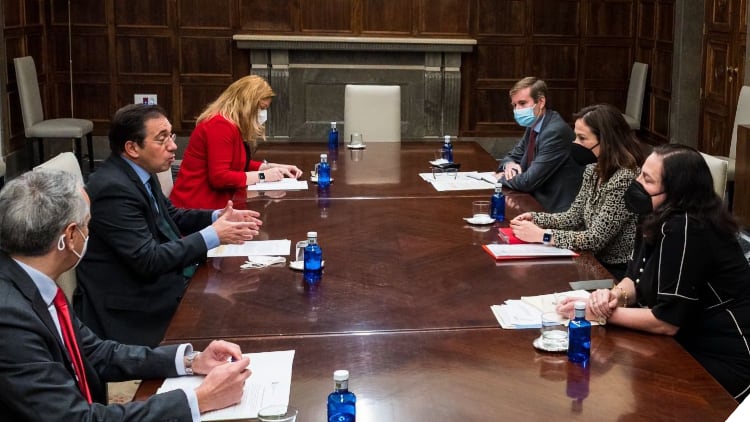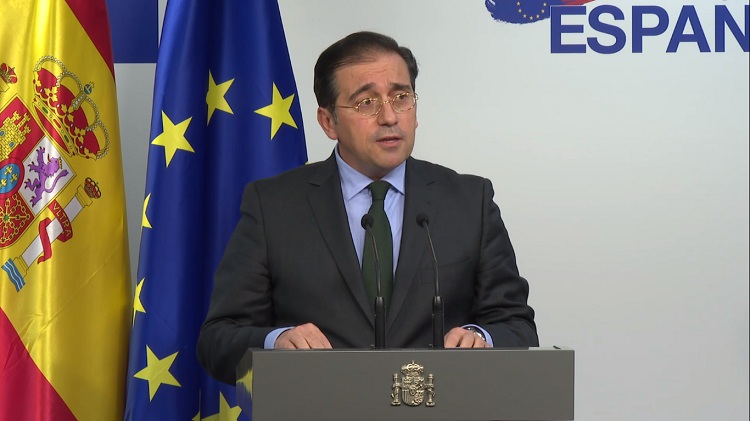Luis Ayllón
Representatives of the main associations of diplomats and relatives of civil servants abroad last week called on the Minister of Foreign Affairs, José Manuel Albares, to adopt measures to improve the situation of Foreign Service employees and their families.
Albares held a meeting last Monday with the directors of the Association of Spanish Diplomats (ADE), the Association of Spanish Diplomatic Women (AMDE) and the Association of Families of the Families of Diplomats and Civil Servants in the Foreign Service (AFD). The meeting was also attended by the Undersecretary of the Ministry of Foreign Affairs, Luis Cuesta, and the Director General of the Foreign Service, Hilda Jiménez.
As The Diplomat has learned from diplomatic sources, the conversation revolved around the demands made by the associations in a letter they sent to the minister, on issues related to the welfare and protection of Foreign Service employees and their families.
Although the minister, as a member of the diplomatic service, is familiar with most of these demands, the representatives of the associations insisted that they should be satisfied and asked him, in his dialogue with other ministries, to try to banish the clichés that consider diplomats to be a privileged group of civil servants in relation to others.
According to the same sources, they stressed that diplomats, especially if they travel abroad with their families, are obliged to assume extraordinary expenses that are not compensated by the allowances assigned to them. Among other things, they are calling for better schooling allowances for their children, adequate health cover for spouses or partners, and greater facilities for them to find a job in their destination countries.
One of the requests they have been making for a long time is for the recovery of the so-called “roots trip”, designed to ensure that the families of diplomats posted abroad do not lose contact with Spain. The trip was instituted decades ago, when Foreign Minister Gregorio López Bravo was Foreign Minister, and allowed diplomats and their families to return to Spain every two years on a trip that was financed by the Ministry and usually took place during the holidays.
In 2005, when Miguel Ángel Moratinos was minister, the ‘trip of roots’ was financed once a year, a decision that, logically, was very well received by diplomats. However, in 2012, the economic crisis led the then minister, José Manuel García-Margallo, to completely abolish this benefit, so that when diplomats want to return to Spain with their families they have to pay for the tickets out of their own pockets, which, in some cases, given the distances involved, can be very costly.
The sources consulted by The Diplomat indicated that Albares informed them that a study has already been carried out on the budgetary impact that reactivating this benefit would have, with a view to the 2023 General Budget, and that he gave them to understand that there are good prospects of recovering the ‘roots trip’, although only every two years, i.e. in its initial version.
In this way, Spain would cease to be, along with Greece, the only country in the European Union that does not have established funding for this trip for diplomats and their families.
The representatives of the associations thanked the minister for this news, but left the meeting less hopeful about other demands, such as the pro-education allowances, because, as Albares told them, the matter depends on the opinion of other ministries, mainly the Ministry of Finance, and he acknowledged the existence of prejudice towards members of the diplomatic career.
The diplomats insisted, according to the aforementioned sources, on asking him to remember that comparatively far fewer civil servants (diplomatic and non-diplomatic) work in the Spanish Foreign Service than in other EU countries, despite the fact that Spain has a powerful diplomatic and consular deployment.
They also stressed that the cost-efficiency and effort of Spanish civil servants is extraordinary and therefore do not understand that their conditions and those of their families are comparatively worse than those of civil servants in other foreign services. As for their salaries in the central services, they added that they are lower than those received by civil servants in other ministries.






